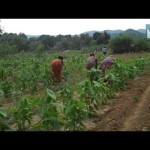Tilopada Village, West Singhbhum District, Jharkhand | Xavier Hamsay
The farming community of Bandgaon block is in the midst of a small revolution. After years of using chemical fertilisers that have slowly leached their soil of any nutrients, they are revisiting organic methods like using vermicompost to nurture the earth.
"Our ancestors have handed us the responsibility of this land and we need to pass it on to our future generations. Keeping this in mind, we need to begin using more of vermicompost and organic farming methods," says Kopi Chaki who has set up a small vermicompost plant at his house. For the past few years he has been holding small workshops across the area to teach people how to make their own compost.
Chemical fertilisers cost small subsistence farmers anything between INR 30 and 35 per kilogram while vermicompost costs about INR 20 per kilogram. "But actually, you can just make it yourself at home. There is an initial cost to set up a pit and get raw materials but after that, each batch can produce up to 80 kilograms of vermicompost," says Community Correspondent Xavier, so impressed by the results of the compost on his own plants that he has been teaching people and showing them this video about composting to his friends, neighbours and anyone who shows an inclination towards organic farming.
Both Kopi and Xavier point out that the initial benefits of switching over from chemicals to compost are few. The vermicompost takes at least a year to start working and so the initial crop yield is low. They both emphasise on the need to make the switch.
"I remember that as a child I would catch little fish in paddy fields. We've almost completely stopped seeing these now as the fertilisers killed them. There are also other small things that our excessive dependence on chemicals and hybrids has resulted in-- food doesn't stay fresh as long as it used to; fruits and grains don't have as many nutrients," reminisces Xavier.
In a state where rural communities are fighting industries for every inch of farming land; where people already face the consequences of dropping water tables and pollution, it is perhaps these small initiatives that will revitalise the soil. The soil on which the future of many identities and lives depend.
Community Correspondents comes from marginalized communities in India and produce videos on unreported stories. These stories are ’news by those who live it.’ they give the hyper local context to global human rights and development challenges. See more such videos at www.videovolunteers.org. Take action for a more just global media by sharing their videos and joining in their call for change.
Fighting for Change: The Story of Bihar-Based Journalist Amir Abbas
Inspiration can come from many sources, but one of the most powerful is seeing someone walk the path before you. Our Community Correspondent, Syed Amir Abbas found his inspiration in Stalin K., the founding director of Video Volunteers. “I met Stalin at VV’s national meet in 2017 and I...
The torch bearer of rights for marginalized tribals of Odisha
If you ask Video Volunteers’ Community Correspondent Bideshini Patel to rate her childhood on a scale of 1-10, she would probably give it a negative marking due to the neglect and abuse she faced. But if you ask her to evaluate her professional life as an impactful journalist, resolving basic...

